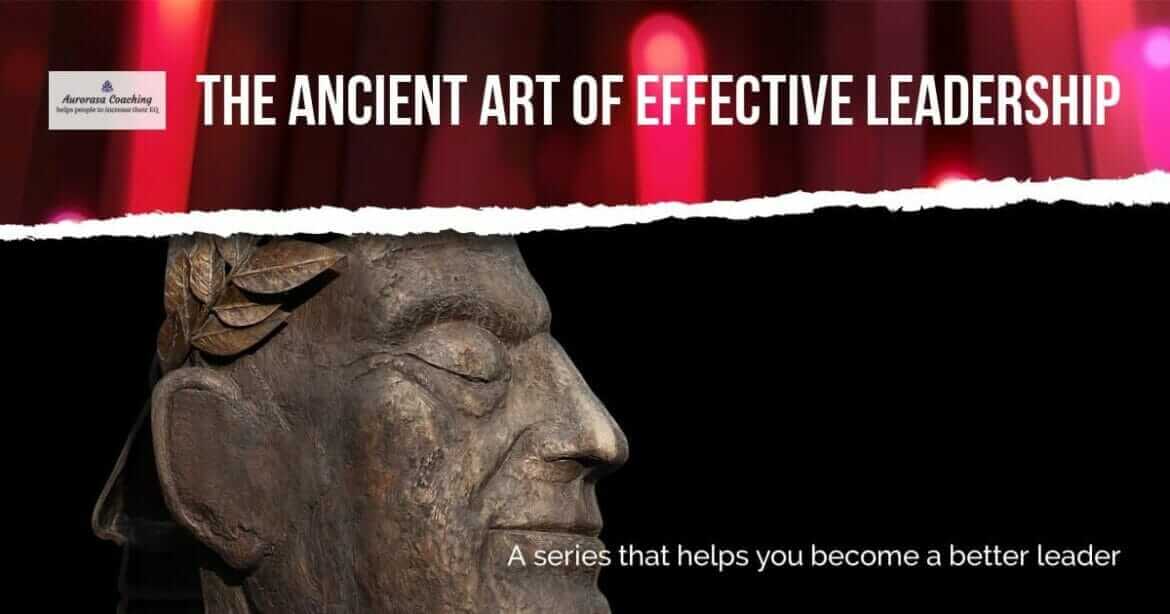

Ancient wisdom for modern leadership is a series aiming to translate the wisdom of great thinkers into easily digestible "doable by you" ideas that will allow you to become a better leader.
But first I need your help. You might think this is a peculiar way to start an article. Here is why I require your help: I lived in Germany for most of my life. Neither my grammar nor my spelling is perfect. I can only imagine how irritating that must be. Please do not let that keep you from taking in the great content I am about to share in this series.
From collector to master
We're always on the hunt for new knowledge. If we attend a seminar and the speaker shares content we heard before, we're bored. We might even get angry. "Tell me something new!"
It's a huge step from information to knowledge, knowledge to wisdom, and wisdom to mastery. What would happen if we implemented what we already know? If we mastered a skill as opposed to just knowing of it?
Information overload is a side-effect of automation and the internet and we're at risk of becoming information collectors rather than masters. Great thinkers, philosophers, and leaders provided all the knowledge we need to become inspiring and effective leaders in 2018.
There is no need for a hunt - just for curating and extracting the essence. The ancient masters produced their work back when people had more time to read.
I assume you don't have a lot of time and even if you're interested in topics such as philosophy, you rarely have time to work your way through hundreds of pages to find the BrainDiamonds™ hidden in there. Is that correct?
I will love to serve you some of these gems, translated into simple and practical bits that will not take over two or three minutes of your time each.
Amor Fati - A love of fate

We owe the first gem to one of my favorite and one of the most polarizing philosophers: Friedrich Nietzsche (1844 - 1900.) Most call him genius, some call him a nihilist and others call him crazy. Perhaps he was a genius with a love for opium towards the end of his life.
In 1885, Nietzsche said:
"It's hard to identify who I am; let's wait a hundred years - perhaps by then there will be a genius and judge of character who will dig out "
Mr. F. N.
Well, here we are, Mr. F.N., digging you out.
Amor Fati. A love of fate. What does Nietzsche mean by that and how can it help you become a better leader?
We cannot change the past or foresee the future. In theory, we know that. Yet we spend a lot of time and energy on petty revenge, past mistakes and worrying what might be.
Marcus Aurelius Antonius describes Amor Fati as a fire. The Roman emperor ruled from 161 to 180 A.D. and has maintained a reputation for being the ideal wise leader. Plato referred to him as a "philosopher king."
The state of mind he describes as a fire allows for living a great life and not just accept but love life's uncertainties and imponderables.
If a fire burns fiercely blazing, it doesn't matter what you throw into it. It doesn't just tolerate the different fuels, but the variety makes it burn even stronger and brighter.
Change management is one of the biggest or even the biggest challenge not just in organizations but also people's personal lives. Life is dynamic and change is inevitable.
Accepting change is a first step, but it's not enough. You need the upgrade to become an excellent leader. The love of the good, the bad and the ugly.
Wanting sets you free.
Love is happiness. Who loves is happy. - Hermann Hesse, An education in happiness
Amor Fati means you're content with your fate. That you want no other outcome for your past, your future - for eternity. It means not just accepting the necessary, even less conceal it, but loving it.
I want to become better and better at perceiving the necessary as the beautiful - that way I will be one of those who make things beautiful. Amor fati - this shall be my love from now on! I don't want to fight a war against the ugly. I don't wan't to accuse, not even my accusers. Walking away shall be my only negation! I want to become an only "yes" sayer. - loosely after Nietzsche
Is this a call for being passive? Not at all, it's the opposite. It's a call for loving your fate instead of tolerating it or allowing it to limit your future success and life satisfaction. That enables you to be at peace and sets you free to work on solutions and create "beauty" in the areas you can influence.
Imagine you stopped using any brainpower and energy on the things you cannot predict and things from the past. And what you perceive as ugly today becomes pure beauty. How much more power will you have to change your environment?
Imagine you could motivate your team to adopt the same mindset. How much happier and more productive would they be?
How much money do your companies's managers spend on pettiness, fighting, attempts to avoid the inevitable, getting back at another manager and so on?
Whatever was or will be - we should love it and grow through it. Because it cannot and will not be different.
There's only the here and now. Life is short and we will die - whether we lived and loved or worried and existed.
Amor Fati
Next part: Experience stretching - How experience can impede leaders and how to avoid it
If you liked this BrainDiamond™, please consider subscribing to this series.
Also, Dr. Mark Goulston, the world's leading expert on leading and one of the leading experts in empathy and I offer a webinar for those who want to make a bigger impact and increase their influence. Learn more HERE
